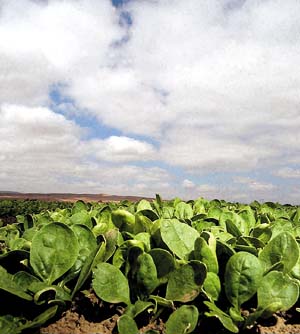
In this county, spinach farmers lost up to $6 million because of
the recall that resulted from the E. coli outbreak, according to
the San Benito County Agricultural Commissioner’s Office. It is
estimated that spinach growers throughout the United States lost
between $50 million and $100 million.
Hollister – Richard Silva, whose Top Flavor Farms grows produce in the San Juan Valley, said the E. coli outbreak traced to spinach a year ago was the most devastating event in his farming career.
In this county, spinach farmers lost up to $6 million because of the recall that resulted from the E. coli outbreak, according to the San Benito County Agricultural Commissioner’s Office. It is estimated that spinach growers throughout the United States lost between $50 million and $100 million.
At the outset of the investigation into the outbreak, Silva’s spinach harvest was stopped. The company continued to water and monitor its fields of baby spinach while the recall remained in place.
But the holding pattern lasted for the rest of the growing season. Many growers – including Silva and Top Flavor Farms – decided to plow under fields of fresh spinach rather than sell to frozen spinach processors for a profit loss.
And while the largest ever investigation into a food-borne illness continued, Silva and other growers had hoped for an answer to prevent another outbreak.
In March, investigators announced they had found traces of the E. coli strain that sickened more than 200 people and killed three in pig feces, cattle feces and river water on Paicines ranch, less than a mile from a Mission Organics spinach field.
But federal and state investigators were unable to find the exact path of the E. coli.
“The solution never really came about,” Silva said.
Mark Wright, who manages farming operations for Hollister-based Filice Farms, said it didn’t take long for the ramifications of the outbreak to set in.
“It became very real, very fast,” Wright said.
Since the outbreak, the farm has quadrupled its tests from planting to harvest time to appease processors to which it sells spinach under the newly established California Leafy Green Marketing Agreement.
Both Filice Farms and Top Flavor Farms use Primus Labs, a third-party auditing company that assesses individual parcels and helps the companies mitigate any safety concerns.
One farm may need a fence, while another property may need a larger buffer to help prevent food-borne illness from making its way into the crop.
“They score you, and your scores become public to your processors,” Wright said.
The outbreak has also educated farmers about food-safety practices in general. Certain practices deemed acceptable before the outbreak no longer fly.
“You start noticing anyone who’s going on your ranch,” Wright said, adding how “neighbors used to be able to go on a walk in the evening with their dogs.”
Even in a year when spinach farmers lost $6 million in revenue because of the recall, the county’s crop value was the highest ever – bringing growers $16.8 million, according to the San Benito County Agricultural Commissioner’s Office.
But as this growing season is nearing its end, the 2007 spinach crop value could be down 10 percent to 20 percent, San Benito County Agricultural Commissioner Paul Matulich said.
Filice Farms is planting 60 percent less spinach than it was a year ago, Wright said. Demand has rebounded for the company since the start of the spinach growing season in March, when Wright said planting was at a quarter of what it was before the outbreak.
The E. coli scare even caused some local farmers to stop planting spinach entirely.
Dale Coke, whose family owns San Juan Bautista-based Coke Farms, said his company was planting about a quarter-acre of spinach per week during the growing season before September’s outbreak, selling primarily to restaurant suppliers.
“It’s not like the guys who were planting 20 to 30 acres a week and it was their main deal,” Coke said. “Those guys were really hurt.”
Coke Farms grows up to 50 different crops throughout the year and for now, he will plant another crop in its place.
“I don’t want to sell anything that people have a question about,” Coke said. “Whether or not it’s a valid question, it makes it harder.”









